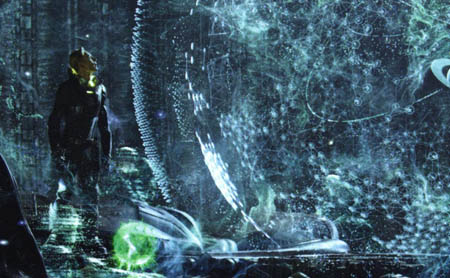Does Ridley Scott’s Prometheus Promise New Hope for Sci-Fi?
By Brian Raftery | June 5, 2012 | 6:30 am

To sci-fi fans, Ridley Scott has always been the one who got away. Thanks to the gloomy double-header of Alien and Blade Runner, the English-born director became a godhead to the Starlog crowd. Then all of a sudden Scott relegated the future to his past, spending the next 30 years voyaging through every genre imaginable—from unicorny fantasy (Legend) to postfeminist road adventure (Thelma & Louise) to arena-rocking sword-and-sandal epic (Gladiator)—while maintaining a healthy distance from androids, aliens, and anything remotely gizmodic.
All that changes in June. Prometheus, a maybe kinda prequel to the Alien saga, finds a group of deep-space explorers (including Michael Fassbender) tracking down an ancient civilization. The movie has the usual nerd bait—spaceships, creatures, a tightly clad Charlize Theron—but the real draw is Scott himself.
What made the director’s sci-fi so brazen was that, in the Lucas-Spielberg era of ILM-assisted optimism, Scott was progressively antiprogress. Alien may seem to be about an exoskeletal beast oozing drool and phallic imagery—which sired a bunch of lesser stowaway-creature features like DeepStar Six and, you know, Alien vs. Predator—but that’s ignoring Alien‘s most dread-inducing twist: The real monsters are man-made, in the form of a scheming, corporate-controlled android and an all-knowing computer system.
Scott picked up the same theme in Blade Runner, with Harrison Ford’s hard-boiled cop hunting down androids (dubbed “replicants”), who are fleeing hard labor and prostitution in a Los Angeles turned pop-up-ad megalopolis. If the real baddies in Alien are the corporate rats who let machines do their dirty work, the villains in Blade Runner are the workaday citizens who have no problem treating robots as slaves.
Thirty years later, many of Scott’s dire predictions have come true. Granted, we aren’t diddling replicants (yet), but the face-hugging power of the iPhone proves just how submissive we are to our gadgets and the corporations that provide them. And Blade Runner‘s downbeat future proved to be too compelling; I dare you to find a post-1982 depiction of a city of the future that doesn’t evoke it. See: The Fifth Element, The Matrix, AI, Dark City, Batman: Arkham City, or even Minority Report. I’ll spot you Gattaca. Sci-fi movies and videogames are all a perpetual bummer.
Which is why Prometheus is so intriguing. Science fiction’s real visionaries have always been, at heart, Panglosses or Cassandras—promising that the best, or worst, was yet to come. In the 1980s Scott foresaw our modern world, and I’m hoping he can do it again—only this time I wouldn’t mind some counterintuitive, upbeat imagineering.
Not to dis dystopia, but I’ve grown tired of being told that the shape of my things to come will be a dimly lit nightmare. Hopefully Prometheus‘ back-to-the-garden plot will yield a bit of 21st-century reverie, or at least some of that old replican-do spirit. Don’t get me wrong, Ridley—it’s really good to see you again. But can we have a new future now, please?









